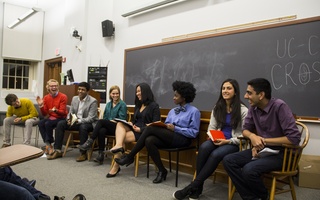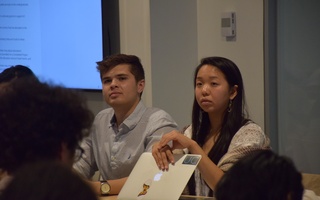{shortcode-636b3da13dda1848ba09b8fed4ee0e8176133175}
How would you describe Harvard students? Those aspiring to join our ranks might call us smart, the best and the brightest. We might like to think of ourselves as ambitious and hardworking. After three years on this campus, I Iament the reality unbeknownst to or ignored by both parties: Harvard students are exceptionally rude.
Before enrolling here, I knew just as much about Harvard as the average American who’s seen Legally Blonde three times: diddly squat. For example, I thought wealthy students would keep their dorms tidy. Getting paid to clean up their mold-laden bedrooms and piss-stained bathrooms that had seen more rat feces than Febreze taught me otherwise. Similarly, I assumed training through boarding schools, country clubs, and cotillions would produce well-mannered undergrads.
This past August, I returned to campus after eight months away. As I toted moving boxes to my dorm, doors were slammed in my face and couldn’t-be-bothered-to-help bystanders greeted me upon my arrival. While I scanned my surroundings in a search for basic human decency, I could practically hear my peers saying, “Those boxes look heavy. Lol, have fun!”
I hold doors open for people all the time. Not in a radical act of feminism or to upend gender roles; I just think it’s a nice thing to do. It’s also a revealing social phenomenon, as I typically receive one of two responses. First: no acknowledgement of the act, no “thank you,” which seems to be a taboo in Harvard vernacular. Second: an overwhelming gratitude — a degree of gratitude typically reserved for a higher power — because such an act never happens here.
Harvard students’ lack of manners pops up on all corners of campus, in every form of action. There’s the classic “acting brand new,” when people like to pretend that they don’t know you. It doesn’t matter that you’ve shared the womb with someone; some impenetrable force requires Harvard students to evade eye contact with you and refuse to say hello. Don’t bother providing an oral history of every class and extracurricular you’ve been in together — they’ll still introduce themselves to you as if you’re just meeting for the first time.
The signature Harvard misbehavior occurs in matters involving commitment. In life’s bakery, Harvard students are croissants: typically European in origin, but more importantly, supremely flaky. With them, there’s little use in setting a date and time for plans; your planner will become most useful when thrown into a fire, heating your flaked-on self.
Harvard students show up late to and skip events as they please, often using the excuses of being busy — as if no one else were — and self-care, which purportedly absolves us of any responsibility. Such excuses preclude reflection of what disregarding other people’s needs might say about our character and degree of selfishness. They disguise inconsideration under the alleged intention of being kind to oneself.
Any kindness we exhibit on this campus is selective. If and only if you can advance my social status, get me a job, or pose as my attractive friend in Instagram photos, I will deign to treat you nicely. Otherwise, a mere smile, “Hello!”, or even acknowledgement of the space you occupy is too much to ask.
Why are Harvard students so rude? Does extending courtesy demand too much time or effort? Most of us aren’t busy as we and our flamboyant Google Calendars like to suggest. I routinely see people who claim constant occupation engaged in needless activity: wasting hours on social media, collecting dust in the dining hall, or eating their boogers in the library. I imagine the resolute dedication to disregarding basic human decency requires far more emotional investment than exhibiting manners does.
Entitlement runs rampant on this campus. We feel entitled to admission to exclusive organizations, internships, and job opportunities. We feel entitled to other people giving us time and attention. But that entitlement seems to be a one way street that serves to allow us to neglect and de-prioritize any action that seemingly doesn’t meet our immediate self interest. Although treating people with respect and acting cordially may create a healthy social ecosystem, 0ur self-centeredness prevents us from valuing that.
The solution is simple: be nicer! I suggest this quick fix with the understanding that doing so might be contrary to the Harvard ethic. The preamble to the Harvard constitution seems to read “We the opportunistic people,” which makes students weary of aiding anyone who cannot immediately return the favor. Experience may have led you to believe that you don’t build a Harvard-worthy resume without letting a few doors slam in your peers’ faces along the way. Kindness and ambition might seem mutually exclusive, the former costly in a competitive world.
Even if the actions don’t stem from the kindness of your heart, take the time to acknowledge people and find ways to make their lives a little easier and brighter. Fake it ‘til you make it — even if you follow these steps and feel like a cold-hearted fraud, crook, or nincompoop, you can at least put “well-versed in basic human decency” on your resume. I’ll even endorse your skills in “manners” and “acting” on LinkedIn.
Jenna M. Gray ’19 is a Sociology concentrator in Leverett House. Her column appears on alternate Mondays.
Read more in Opinion
Vote No on Ballot Question One

















